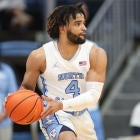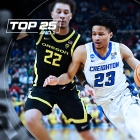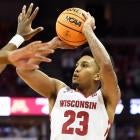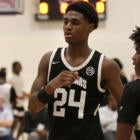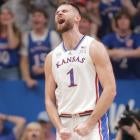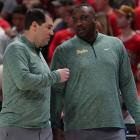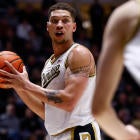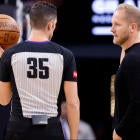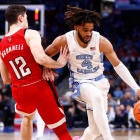
As the 2024 NCAA Tournament lurks around the corner, awards season is approaching with a swiftness. So, it's officially time to start thinking about -- and debating -- what this year's All-American teams will look like for the 2023-24 college basketball season. And if you're a voter, I offer you this: good luck.
There's a few easy choices for First Team All-American status, but there are countless ways you could spin data to manipulate and make cases for or against players among the teams. Purdue star Zach Edey figures to be a consensus All-American after winning National Player of the Year last season, but he very well may be the only one. That leaves voters in a spot to determine the value of players by team success or individual success (or some combination of the two) to fill out their squads.
I don't envy them. Of course, I'll have to build out my own official ballot in the coming weeks -- CBS Sports does its All-American teams after most of the NCAA Tournament has played out -- but the Associated Press and many other major award voters will be releasing their choices within the next week. So, with the information we currently have at hand, below is my best guess at how the All-American teams will shake out.
First Team
Zach Edey, Purdue: I won't go as far to say Edey is a lock to win player of the year quite yet; I'd like to see how the NCAA Tournament plays out, and Purdue fizzling early again could change the landscape. I will, however, go out on the tiniest ledge in human history and declare him a First Team All-American. He's the scoring leader and player efficiency leader in college hoops this season for a Purdue team on track to be a No. 1 seed.
Dalton Knecht, Tennessee: The SEC Player of the Year has all but locked up a spot on the First Team after a heroic senior season lifting Tennessee to a regular-season conference title. The former Northern Colorado standout is averaging 21.4 points per game and shooting above 40% from 3 on the season, which are remarkably career highs despite jumping up from the Big Sky to the SEC.
RJ Davis, North Carolina: UNC bounced back from missing the NCAAs last year to win the ACC outright behind a stellar season from Davis, who took on a major role in the absence of Caleb Love. Davis averaged an ACC-leading 21.1 points per game on the year and was consistent all season, recording 19 games of 20 or more points and three games where he scored 30 or more.
Jamal Shead, Houston: Shead is the lead dog on a Houston team that has rated No. 1 in most metrics this season and owns the No. 1-ranked defensive unit in KenPom's efficiency metrics. The Cougars star is top five in the Big 12 in both steals and assists, and he's the heartbeat of a Houston team poised to potentially win its first ever national championship.
Terrence Shannon Jr., Illinois: It's hard to stand out in the Big Ten while living in the shadow of Edey, but Shannon has managed to do it by posting a career-best 21.7 points per game for an Illinois team that all season was in its own tier as the No. 2 in the league behind Purdue. Shannon ranked No. 2 in the Big Ten in scoring and top 10 in the conference this season in 3-pointers made per game, minutes per game and field goal percentage.
Second Team
Tristen Newton, UConn: UConn has an embarrassment of riches on its roster, but Newton should be acknowledged as its most important piece. Leading the team in points and assists, Newton heads up a UConn team that has been ranked No. 1 most of the season and will enter the NCAAs as a favorite to repeat as champs.
Tyler Kolek, Marquette: Kolek was playing as well as anyone in college basketball the last month of the regular season before an oblique injury knocked him out of the final few games and the Big East Tournament. He led the sport in assists per game.
DaRon Holmes, Dayton: Willing to bet Holmes is higher on my list than where he will land on others. That's OK. He averaged 20.2 points and 8.3 boards as the clear best piece of a Dayton team that was among the best in the Atlantic 10 all season.
Reed Sheppard, Kentucky: Despite not starting most of the season, Sheppard's late-season emergence as one of the best players in the sport is impossible to ignore. He's shooting above 50% from 3-point range on high volume and serving as one of the few true playmakers on the defensive side of the ball in college hoops. If Kentucky makes a deep run, it'll be because of Sheppard. Placing him on the Second Team may end up feeling like Shappard was sold short in hindsight.
Devin Carter, Providence: The best player in the Big East this season. Carter's Friars weren't quite good enough to warrant First Team status, but he belongs on the Second Team and in the same tier -- if not above -- as fellow conference foes Kolek and Newton.
Third Team
Kevin McCullar Jr., Kansas: A bone bruise for McCullar hampered him physically for weeks on end and may have damaged his First Team All-American hopes as well. But, he was tremendous when at full strength this season for Kansas, averaging a career-high 18.3 points per game and shooting an improved 33.3% from 3-point range.
Antonio Reeves, Kentucky: For as good as UK's freshmen have been down the stretch of the regular season, Reeves deserves credit as the stabilizing and consistent force he was all year. He led Kentucky in scoring and finished third among all SEC players in that category behind only Knecht and Mark Sears.
Hunter Dickinson, Kansas: Dickinson was every bit the physical interior presence for Kansas it hoped he'd be when he transferred in after a standout career with Michigan. He averaged a double-double in points and rebounds on the season and finished with the most points and rebounds among KU players as well as the highest PER and highest box plus/minus.
Kyle Filipowski, Duke: Various Duke players have stepped up and shined this season, but none have been as good or consistent as Filipowski. He's the driving force behind the Blue Devils' top-10 offense with inside-out versatility like no other big man in the sport.
Mark Sears, Alabama: Sears was the focal point of an Alabama offense that rated No. 1 throughout most of the season. He averaged 21.1 points and 4.1 assists per game for the Crimson Tide, who finished just one game off the pace of SEC-leading Tennessee in the regular season while hitting a career-best 44.1% from 3.
Still in the hunt ...
- Baylor Scheierman, Creighton
- Rob Dillingham, Kentucky
- Caleb Love, Arizona
- Jaedon Ledee, San Diego State
- Johni Broome, Auburn
- Ryan Kalkbrenner, Creighton












